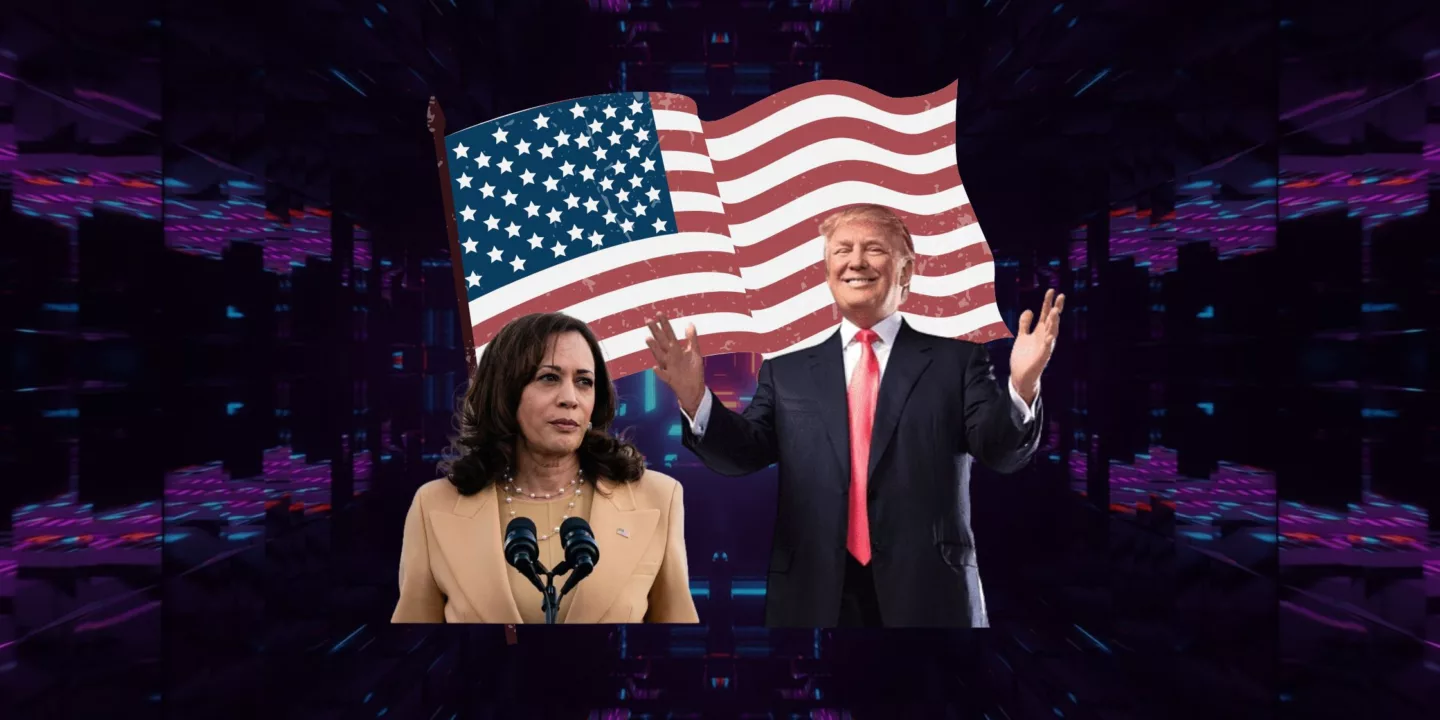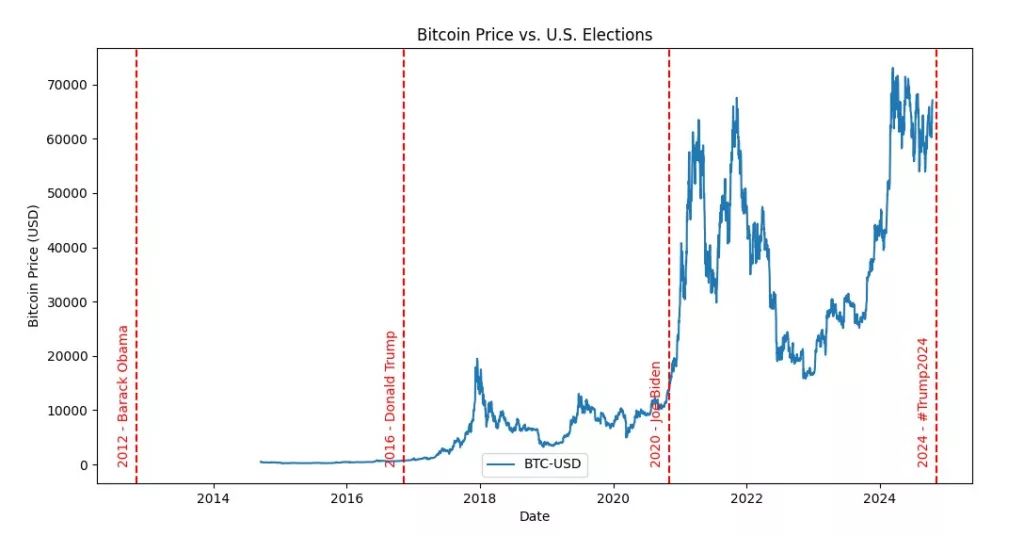
As the United States gears up for the 2024 presidential election, its outcome could send ripple effects through the global financial landscape. The cryptocurrency market, which has developed into a sizable asset class over the past ten years, is one area that is being closely examined.
The U.S. elections are not just about deciding the future political leadership but could also influence policy directions that significantly affect the value and regulation of digital currencies.
In 2024, the cryptocurrency market saw significant maturation, with Bitcoin reaching new all-time highs and both Bitcoin and Ethereum gaining substantial institutional traction through the approval of spot ETFs in the U.S. The approval of spot Bitcoin and Ether ETFs has played a pivotal role in furthering adoption, making cryptocurrencies more accessible to traditional investors.
Additionally, the growing integration of digital currencies into the global economy—from cross-border payments to decentralized finance (DeFi) applications—demonstrates how far the industry has come.
A considerable portion of the U.S. populace has also become crypto holders, further driving adoption. However, this surge in popularity has drawn the attention of regulators and policymakers, with the U.S. government eyeing tighter regulatory scrutiny. As a result, the 2024 U.S. presidential election holds crucial implications for the future of the crypto space due to the potential for increased oversight.
Political events have long influenced financial markets, and the 2024 U.S. presidential election is no exception. Investor sentiment toward cryptocurrencies can fluctuate dramatically based on election outcomes. For example, a candidate who supports cryptocurrency regulation that favors innovation and growth may boost market confidence. In contrast, a candidate pushing for stricter regulations could dampen enthusiasm and lead to a temporary sell-off.
Donald Trump’s stance on cryptocurrency has notably shifted as he prepares for the 2024 U.S. presidential election, positioning himself as a pro-crypto candidate. Previously skeptical of digital currencies, Trump has embraced the crypto community, aiming to attract both voters and significant financial backing from the industry. At a recent cryptocurrency conference, he declared his ambition for the U.S. to become the “crypto capital of the planet,” proposing policies such as establishing a national Bitcoin stockpile and creating a presidential advisory council focused on cryptocurrency. His campaign now accepts Bitcoin donations, and he has even launched NFT trading cards featuring himself, further solidifying his commitment to appealing to crypto supporters.
On the other hand, Harris, whose position on crypto remained ambiguous until very recently, could advocate for further regulatory clarity without significantly hindering the industry’s growth. However, despite this shift, Donald Trump continues to be perceived as the more pro-crypto candidate. Ultimately, the market dynamics will largely depend on which candidate takes office and their approach to fostering or restraining crypto innovation.
The outcome of the 2024 election could lead to significant changes in the regulatory environment for cryptocurrencies. Elections often usher in new legislative frameworks, and for cryptocurrencies, this is particularly crucial.
A pro-innovation administration could introduce laws that legitimize cryptocurrency usage, encourage institutional investment, and potentially lead to wider adoption. Alternatively, an administration with a conservative stance toward digital currencies might impose regulations that could stifle growth and innovation.
As of now, the regulatory framework for crypto in the U.S. remains somewhat fragmented. Different agencies, such as the Securities and Exchange Commission (SEC) and the Commodity Futures Trading Commission (CFTC), have varying interpretations of what constitutes a security or commodity in the crypto space.
The incoming president and their administration will have the power to guide these regulatory bodies, shaping the future of crypto in the country. Regardless of the winner, legislative clarity is vital for ensuring the industry’s continued legitimacy and growth.
The U.S. presidential election could also create opportunities for long-term cryptocurrency investors. The election cycle often brings heightened volatility, which can create both risks and rewards for investors. Institutional investors are particularly focused on the regulatory clarity that a new administration could bring, as it will directly impact their strategies for engaging with digital assets.

Over the past year, institutional interest in cryptocurrencies has continued to grow, with major banks, investment funds, and even pension funds exploring blockchain and crypto investments. The election may further influence the risk-reward balance in the market.
For instance, if a pro-crypto candidate wins, we could see an influx of institutional capital as regulatory concerns are alleviated. Conversely, a crackdown on the industry could prompt more cautious approaches from larger investors.
The public perception of cryptocurrencies has evolved significantly, with a growing number of people recognizing the potential benefits of digital currencies. However, when it comes to the election, crypto may not be the top priority for most voters. Issues like healthcare, jobs, and immigration often dominate public discourse, but the crypto community’s desire for political recognition is strong.
Many believe that the more political campaigns engage with the subject of cryptocurrency, the more likely it is to gain broader acceptance.
While the crypto vote may not swing the election on its own, the increasing importance of digital currencies in the financial system suggests that more candidates will need to address the issue in the future. Whether cryptocurrency becomes a central talking point in the 2024 election remains to be seen, but the community’s influence on political discourse is undoubtedly growing.
The 2024 U.S. presidential election will have a profound impact on the cryptocurrency market, potentially shaping its future for years to come. From influencing market sentiment to driving regulatory changes, the election’s outcome will be a pivotal factor for crypto investors. As the industry continues to grow and evolve, investors and enthusiasts alike must stay informed about political developments and how they may affect the crypto landscape.
The future of cryptocurrency will largely depend on the political climate that follows the election. Regardless of who wins, the role of elections in shaping crypto regulation and mainstream acceptance cannot be understated. Investors should remain vigilant and ready to adapt their strategies in response to the political shifts that are sure to come.
Mudrex provides a platform that keeps users informed about the most recent legal developments affecting the cryptocurrency industry. Users can trade with confidence in a safe and legal environment because of our tools and resources. Mudrex makes sure that traders can easily manage intricate regulatory structures to help them stay competitive in a regulated market.
To begin trading cryptocurrencies, download the Mudrex app from Google Play.
The election could have a significant impact on Bitcoin, particularly through regulatory changes and investor sentiment shifts based on the incoming administration’s stance on cryptocurrency.
Cryptocurrency will likely see further institutional adoption, regulatory scrutiny, and integration into the global financial system, with the election playing a key role in shaping this future.
While unlikely to be the sole issue, crypto could influence certain voter demographics, particularly those invested in the digital economy.
Yes, the election will help define the regulatory framework and political climate surrounding cryptocurrencies, which could significantly impact their long-term viability.